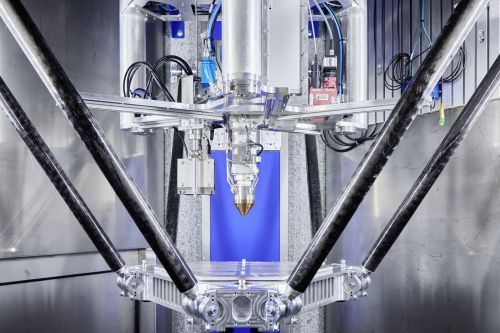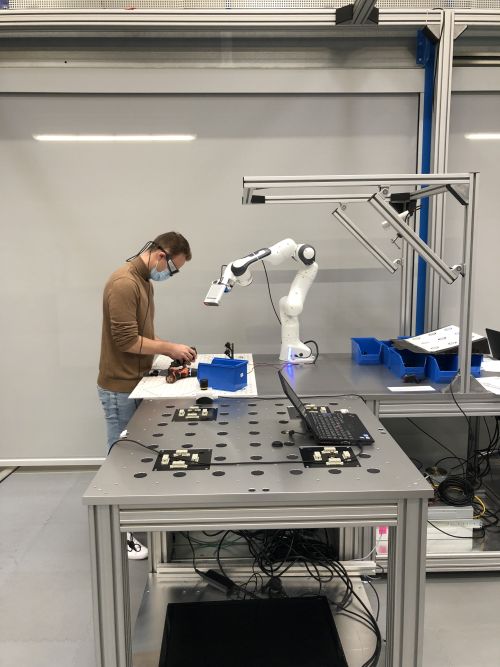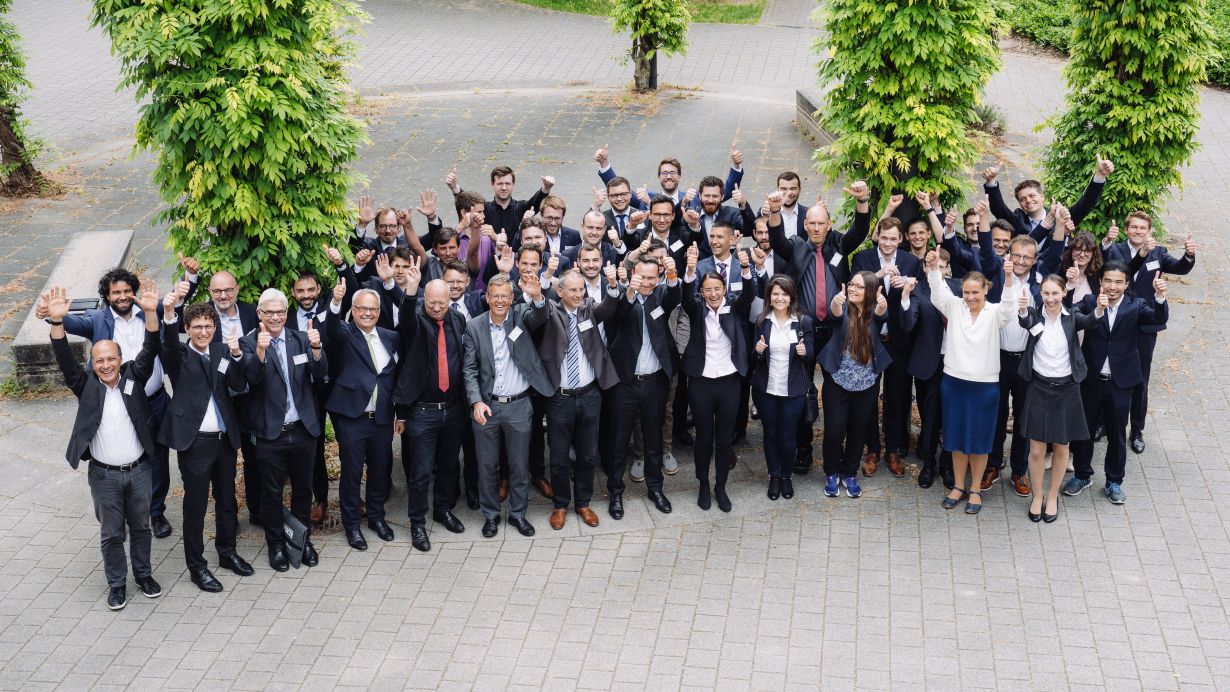According to Global Footprint Network, the rapidly growing resource consumption all around the globe is so excessive that, in 2022, 1.75 Earths would have been necessary to cover it. Researchers of Karlsruhe Institute of Technology (KIT) are devoted to fundamentally changing the current, linear economic approach (take, make, use, dispose). For their alternative solution, they rely on the circular processes of closed-loop economy: In the circular factory, used products are reprocessed in an automated way as far as possible so that they can leave the factory as new products. This initiative is the focus of the new Collaborative Research Center (CRC) 1574 entitled “Circular Factory for the Perpetual Product” at KIT, which will be funded by the Deutsche Forschungsgemeinschaft (DFG, German Research Foundation) with EUR 11 million.
Manufacturing companies in particular face the challenge to come up with economic approaches for circular large-scale production. Today, circular economy is mainly restricted to low-wage countries where small batch series with a high proportion of manual steps are produced. For example, in Europe, the percentage of material recycled and reintroduced into the economic cycle in 2023 is a mere 7.2 percent (see: www.circularity-gap.world/2023). “As a society, we cannot continue to simply dispose of products that are no longer needed. To achieve a long-term use of our resources, we have to move towards circular economy systematically so that at best, we can use products or their components perpetually. Circular economic approaches running in the same vein are the focus of the new CRC, which pools the skills of the researchers from mechanical engineering, computer science as well as electrical engineering and information technology,” says Professor Oliver Kraft, representing the President of KIT.
Vision of the Perpetual, Innovative Product
So far, remanufacturing, i.e. reprocessing of used products, was considered the method with the highest standard with regard to the quality and warranty criteria of the reprocessed products. “This is the only circular method able to compete with a new product for that matter. The vision of a ‘circular factory’, however, goes far beyond that point. It consists in enabling integrated linear and circular manufacturing of new products at an industrial scale where different products require different degrees of reprocessing,” explains Professor Gisela Lanza, who heads the wbk Institute of Production Science of KIT and is spokesperson for the CRC.
The goal of the circular factory is to upgrade used products to the state of current product generations so that we get closer to the vision of the perpetual, innovative product. Even though “perpetual” usage of a used product substance appears to be virtually impossible, the vision of the perpetual, innovative product should be adopted. Lanza compares this to the Pole Star that represents the perfect direction towards which everything is to be oriented.
“The Collaborative Research Center 1574 marks a cornerstone in our research program for the next decade at the wbk Institute of Production Science. Our fundamental research forms the basis for the shift in economy from linear to circular models and the capability of a circular factory to manufacture the perpetual, innovative product,” explains Lanza. On this basis, she and her team want to launch numerous joint application-related projects with industry that pave the way for a sustainable and innovative future.

sector for reprocessing metal components as shown here, the team of the wbk Institute of
Production Science is ready to take off. (Photo: Beckhoff)

technology that learns from humans. (Photo: wbk, KIT)
Range of Topics and Project Areas
In order to explore processes and mechanisms that are still unknown, the CRC team addresses scientific issues from production engineering, product development, and materials technology, human and industrial engineering, robotics, computer science, and knowledge modeling. The key research questions are: How can new products be generated from unique used products? How can its functionality be guaranteed for the second lifecycle? How can humans learn complex strategies for problem solution and how are these strategies transferred to automated production technology? How can all this be implemented in a changeable, autonomous production system so that economic circular manufacturing of large-scale series is possible even in high-wage countries? How can data and information be leveraged to further improve the process?
The CRC is subdivided into three project areas: Project area A will explore planning and control of the circular factory to achieve maximum value retention of unique used products for the primary market; project area B will devise measuring strategies for capturing, modeling, and evaluating each product state and for capturing and interpreting human process execution; and project area C will create an entirely modular production system that enables continuous adaptation to the latest product instance. Building the circular factory at laboratory scale is planned for the first funding period. The DFG will fund the project from April 01, 2024 until December 31, 2027 with approx. EUR 11 million.
Participating Research Institutions
Karlsruhe Institute of Technology:
- Institute for Applied Materials: Dr. Stefan Dietrich, Prof. Volker Schulze
- Institute for Anthropomatics and Robotics: Prof. Tamim Asfour, Prof. Jürgen Beyerer, Prof. Gerhard Neumann, Prof. Rainer Stiefelhagen
- Institute of Human and Industrial Engineering: Prof. Barbara Deml
- Institute for Materials Handling and Logistics: Prof. Kai Furmans
- Institute of Industrial Information Technology: Prof. Michael Heizmann
- Institute of Nanotechnology: Dr. Michael Selzer
- Institute of Product Engineering: Prof. Albert Albers, Prof. Tobias Düser, Dr. Patric Grauberger, Prof. Sven Matthiesen
- Institute of Production Science: Prof. Jürgen Fleischer, Prof. Gisela Lanza, Prof. Volker Schulze, Prof. Frederik Zanger
Fraunhofer-Gesellschaft:
- Fraunhofer Institute of Optronics, System Technologies and Image Exploitation: Prof. Jürgen Beyerer, Dr. Julius Pfrommer
Aalen University – Technology and Economics:
- Prof. Nicole Stricker
Stuttgart University:
- Institute for Artificial Intelligence: Jun. Prof. Alina Roitberg, Prof. Steffen Staab
More information on the Collaborative Research Center
More information: https://www.wbk.kit.edu
Being “The University in the Helmholtz Association”, KIT creates and imparts knowledge for the society and the environment. It is the objective to make significant contributions to the global challenges in the fields of energy, mobility, and information. For this, about 10,000 employees cooperate in a broad range of disciplines in natural sciences, engineering sciences, economics, and the humanities and social sciences. KIT prepares its 22,800 students for responsible tasks in society, industry, and science by offering research-based study programs. Innovation efforts at KIT build a bridge between important scientific findings and their application for the benefit of society, economic prosperity, and the preservation of our natural basis of life. KIT is one of the German universities of excellence.

